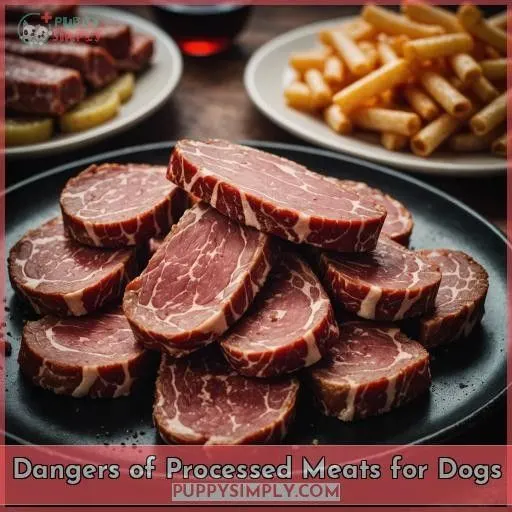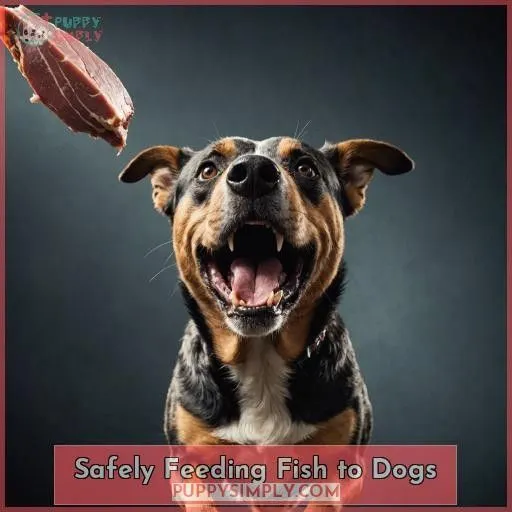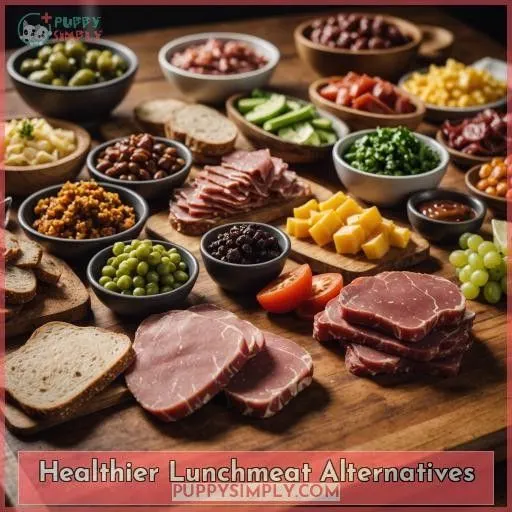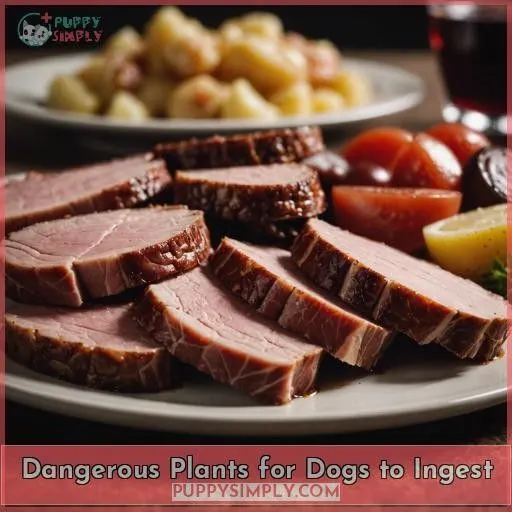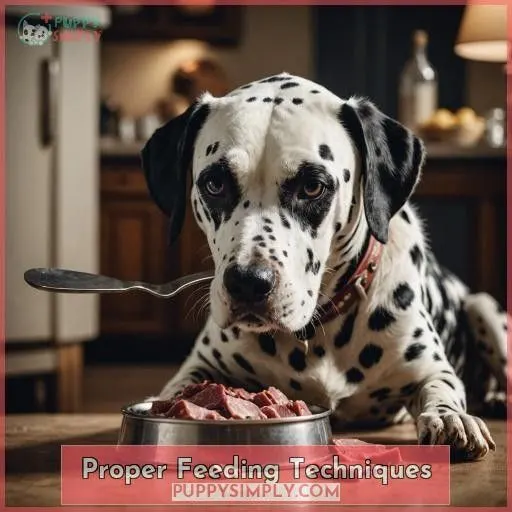This site is supported by our readers. We may earn a commission, at no cost to you, if you purchase through links.

While small amounts can be an occasional treat, it’s best to avoid feeding your pup bacon, ham, hot dogs, and sausages. These processed meats put your dog at risk for digestive issues, pancreatitis, and even sodium ion poisoning.
Instead, opt for healthier protein sources like lean chicken or turkey.
If you want to make sure your furry friend stays happy and healthy, consulting a veterinarian about their dietary needs is advisable – there’s more to think about than just lunch meat.
Table Of Contents
- Key Takeaways
- Can Dogs Eat Lunch Meat?
- Dangers of Processed Meats for Dogs
- Chicken and Pork Considerations
- Safely Feeding Fish to Dogs
- Moderation is Key for Lunchmeat
- Healthier Lunchmeat Alternatives
- Monitoring Your Dog’s Lunchmeat Intake
- Toxic Spices and Herbs for Dogs
- Dangerous Plants for Dogs to Ingest
- Healthy Human Foods for Dogs
- Proper Feeding Techniques
- Frequently Asked Questions (FAQs)
- Conclusion
Key Takeaways
- Processed meats like bacon, ham, hot dogs, and sausages are dangerous for dogs due to high levels of salt, fat, and harmful additives
- Feeding your dog small amounts of turkey or chicken lunch meat may be acceptable as an occasional treat, but moderation is key
- Avoid feeding your dog raw chicken or pork, as they can harbor dangerous bacteria, and limit seasoned pork intake
- Consult your veterinarian to understand your dog’s specific dietary needs and choose healthy, dog-friendly protein sources and snacks
Can Dogs Eat Lunch Meat?
No, dogs shouldn’t eat lunch meat. Lunch meat is high in salt, fat, and preservatives that can be harmful to dogs and cause digestive issues, pancreatitis, and sodium ion poisoning.
Dangers of Processed Meats for Dogs
Processed meats like bacon, ham, hot dogs, and sausages are dangerous for dogs due to their high salt, fat, and additive content. These meats can cause serious health issues such as digestive problems, pancreatitis, and even sodium ion poisoning, so it’s best to avoid feeding them to your furry friend.
High in Salt, Fat, and Additives
Processed lunch meats are a minefield for your pup. They’re loaded with:
- High sodium levels that can lead to dehydration and electrolyte imbalances.
- Excessive fat that may trigger pancreatitis.
- Harmful additives like nitrates and preservatives that can be toxic.
Stick to plain, unseasoned chicken or turkey for a safer, healthier treat.
Can Cause Digestive Issues, Pancreatitis, and Sodium Ion Poisoning
Processed meats like lunch meat can wreak havoc on your pup’s digestive system. The high salt, fat, and additives can lead to vomiting, diarrhea, and even life-threatening pancreatitis. Sodium ion poisoning is another risk, causing tremors and seizures. Prioritize your dog’s health by offering safer alternatives like all-natural chicken or turkey. Consult your vet to understand your pup’s dietary needs.
| Potential Issues | Symptoms |
|---|---|
| Digestive Problems | Vomiting, Diarrhea |
| Pancreatitis | Abdominal Pain, Lethargy |
| Sodium Ion Poisoning | Tremors, Seizures |
Avoid Bacon, Ham, Hot Dogs, Sausages
Steer clear of processed meats like bacon, ham, hot dogs, and sausages. These contain harmful additives such as nitrates, nitrites, and preservatives that can cause serious health issues in dogs, including digestive problems, pancreatitis, and even sodium ion poisoning. Opt for healthier options like plain, unseasoned chicken or turkey instead.
Chicken and Pork Considerations
You should always avoid feeding your dog raw chicken or pork, as these can cause bacterial infections. Regarding pork, it’s best to limit your dog’s intake of seasoned varieties and monitor portion sizes carefully, as excessive consumption can lead to health issues.
Avoid Raw Chicken and Pork
Steer clear of raw chicken and pork – they can harbor dangerous bacteria that could make your pup sick. Chicken may also trigger allergies in some dogs. And raw pork carries the risk of trichinosis, a nasty parasite infection. In regard to these meats, it’s best to stick to cooked, unseasoned portions to keep your canine companion happy and healthy.
- Avoid raw chicken due to bacterial infections
- Steer clear of raw pork to prevent trichinosis
- Monitor portion sizes carefully to prevent digestive issues
Limit Seasoned Pork Intake
Regarding pork, exercise caution. Seasoned pork may be hazardous, so restrict its consumption. Chicken may also elicit allergic reactions in some dogs. To safeguard your pet’s well-being, seek advice from your veterinarian regarding its dietary requirements. Choose high-quality, all-natural options such as ground turkey instead of processed meats. Your dog’s health is of utmost importance.
| Pork Risks | Chicken Allergies | Dietary Needs |
|---|---|---|
| Seasoned pork can be harmful | Some dogs may be allergic | Consult your vet |
| Limit intake to be safe | Monitor for reactions | Tailor to your dog |
Monitor Portion Sizes Carefully
When feeding your pup chicken or pork, be mindful of portion sizes. Stick to small servings and avoid seasoned meats, as these can upset their stomach. Consult your vet to understand your dog’s dietary needs. Prioritize high-quality dog treats and snacks over processed meats. Enrich their meals with slow feeders and puzzle toys for a healthier, happier hound.
Safely Feeding Fish to Dogs
When providing fish to your dog, it’s imperative to steer clear of uncooked fish as it can harbor harmful bacteria that may lead to infections. Furthermore, you should eliminate all bones and restrict the consumption of fish with extended lifespans, such as tuna or swordfish, due to their potential for elevated levels of mercury and other heavy metals.
Avoid Raw Fish Due to Bacterial Infections
Raw fish poses serious bacterial risks for dogs. Salmonella, listeria, and other harmful microbes can make your pup seriously ill. Avoid feeding raw fish altogether to keep your canine companion safe. Long-lived fish like tuna and swordfish also contain high levels of heavy metals that can be toxic over time. Stick to safer options like cooked turkey or fish.
Avoid Fish Bones
Fish bones pose a serious threat to your dog’s health. Their sharp edges can puncture the digestive tract, while their small size makes them choking hazards. Avoid feeding your pup any fish with bones, including ham, turkey bacon, turkey sausage, and turkey jerky. Stick to boneless, skinless options like turkey burgers to keep your canine companion safe.
Limit Long-lived Fish Due to Heavy Metal Content
While fish can be a great protein source for dogs, certain long-lived fish like shark, swordfish, and tuna can accumulate high levels of heavy metals like mercury. To limit your dog’s exposure, opt for smaller, shorter-lived fish like salmon, sardines, or tilapia. Pair fish with fruits, veggies, and lean proteins like smoked turkey for a balanced, healthy diet.
- Choose smaller, shorter-lived fish to reduce heavy metal absorption.
- Pair fish with fruits, vegetables, and lean proteins like smoked turkey.
- Monitor portion sizes and consult your vet to guarantee your dog’s diet is nutritionally complete.
Moderation is Key for Lunchmeat
While lunchmeat can be an occasional treat for dogs in moderation, it’s essential to assess the advantages and disadvantages thoroughly. Prioritize premium, all-natural dog treats or alternatives such as plain chicken or minced turkey as healthier options for your canine companion.
Small Amounts May Be Acceptable
While a small amount of lunchmeat may be acceptable as an occasional treat, moderation is key. Consider the risks – high sodium, harmful additives, and potential digestive issues. Instead, opt for healthier alternatives like all-natural chicken or ground turkey. Monitor your dog’s intake carefully and consult your vet if you have any concerns about lunchmeat hazards.
| Risks | Alternatives |
|---|---|
| High sodium | All-natural chicken |
| Harmful additives | Ground turkey |
| Digestive issues | Dog-friendly snacks |
Weigh Pros and Cons
While the occasional lunchmeat treat may seem harmless, it’s important to weigh the pros and cons. Processed meats can be high in sodium, nitrates, and other additives that may trigger dog allergies or increase cancer risks. Moderation is key – stick to small portions and prioritize your pup’s dietary balance with safe veggies and high-quality dog treats.
Prioritize High-quality Dog Treats
Instead, prioritize high-quality dog treats that are free from harmful additives like nitrates, nitrites, and excess salt. These treats won’t upset your pup’s digestion or exacerbate any allergies. Look for options made with safe, natural ingredients like chicken or turkey. Your dog will love the delicious flavor and you’ll have peace of mind.
Healthier Lunchmeat Alternatives
You should prioritize feeding your dog all-natural chicken or ground turkey as a safer alternative to processed lunchmeat. For healthy snack options, offer dog-friendly fruits and vegetables like carrots, broccoli, and celery, or consider high-quality dog treats.
All-natural Chicken or Ground Turkey
If you’re looking for a healthier alternative to processed lunchmeat, all-natural chicken or ground turkey are great options. These meats are less likely to cause allergic reactions, bacterial infections, or pancreatitis risk. Just be mindful of portion sizes, as they can still be high in sodium and potentially contain heavy metals if not sourced carefully.
Fruits and Vegetables
Fruits and vegetables make excellent, healthy alternatives to processed lunchmeat for your canine companion. Broccoli, carrots, and kale are packed with essential nutrients and fiber that dogs can enjoy in moderation. Just be sure to introduce new foods slowly and watch for any digestive issues. With a little creativity, you can whip up delicious, dog-friendly snacks using fresh produce.
Dog-friendly Snacks
While processed meats like bacon and hot dogs are off-limits, you can still treat your pup to some delicious and nutritious dog-friendly snacks. Try offering sliced apples, carrot sticks, or frozen blueberries as occasional indulgences. For homemade treats, bake up some sweet potato or peanut butter bites – your dog’s favorite snacks are just a kitchen away!
Monitoring Your Dog’s Lunchmeat Intake
To safeguard your dog’s well-being, it’s imperative to keep an eye on their lunchmeat consumption and seek professional advice if you have any doubts. Steering clear of processed meats and giving precedence to premium, dog-appropriate treats and snacks is the optimal strategy for conscientious pet owners.
Know Your Dog’s Dietary Needs
Understanding your dog’s dietary requirements is essential when offering lunchmeat.
Observe for allergies.
Refrain from giving raw chicken or seasoned pork, as they can cause digestive problems.
Fish bones can pose a choking risk.
Fish that live long may accumulate heavy metals, so portion sizes are important.
Pay attention to your pup’s reactions to specific foods and adjust accordingly.
Consult a Veterinarian With Concerns
If you have any worries about your dog’s lunchmeat consumption, it’s best to consult your veterinarian. They can evaluate your pup’s dietary requirements and provide tailored guidance on safe portion sizes and monitoring their lunchmeat intake. Don’t hesitate to seek professional advice to guarantee your furry friend remains happy and healthy.
Avoid Processed Meats
Steer clear of processed meats like bacon, ham, and hot dogs – they’re loaded with harmful additives that can wreak havoc on your pup’s health. The high salt and fat content puts them at risk for sodium ion poisoning, digestive issues, and even pancreatitis. Opt for healthier, all-natural treats instead.
- Processed meats contain dangerous additives like nitrates and preservatives that can be toxic to dogs.
- The high sodium and fat content in these foods can lead to dehydration, digestive problems, and pancreatitis.
- Avoid feeding your dog any bacon, ham, sausages, or other highly processed meat products.
- Choose wholesome, dog-friendly snacks like fresh fruits, veggies, or high-quality dog treats instead.
Toxic Spices and Herbs for Dogs
Many common spices and herbs, including nutmeg, cinnamon, paprika, onion powder, and garlic powder, can be toxic to dogs and cause digestive upset, liver damage, or neurological issues. It’s essential to keep these seasonings away from your furry friend and choose dog-safe ingredients when preparing meals or treats.
Nutmeg, Cinnamon, Paprika, Onion Powder, Garlic Powder
Certain spices like nutmeg, cinnamon, paprika, onion powder, and garlic powder can be highly toxic to dogs. These herbs can cause serious digestive issues, liver damage, and even neurological problems if ingested. Steer clear of these dangerous seasonings and stick to dog-safe herbs to keep your pup healthy and happy.
Can Cause Digestive Issues, Liver Damage, and Neurological Problems
Certain spices and herbs can wreak havoc on your pup’s health. Nutmeg, cinnamon, paprika, onion powder, and garlic powder are all toxic ingredients that can cause:
- Digestive issues like vomiting and diarrhea
- Liver damage
- Neurological problems like tremors and seizures
Steer clear of these harmful additives to keep your canine companion safe and healthy.
Dangerous Plants for Dogs to Ingest
You must be extremely cautious about certain plants that can be toxic and cause serious health problems if ingested by your dog. Wild cherry, azaleas, mushrooms, dieffenbachia, and mistletoe are examples of dangerous plants that should be kept away from your furry friend.
Wild Cherry, Azaleas, Mushrooms, Dieffenbachia, Mistletoe
Other plants to avoid include wild cherry, azaleas, mushrooms, dieffenbachia, and mistletoe. These pose toxic ingestion risks for your furry friend if consumed. For pet safety, steer clear of these garden and indoor dangers when allowing your dog access to new areas – their curiosity could be hazardous!
Can Be Toxic and Cause Serious Health Problems
Toxic plants like wild cherry, azaleas, and mushrooms can pose a serious threat to your dog’s health if ingested. Symptoms may include digestive issues, liver damage, and even neurological problems. Be extra vigilant, as even small amounts can be dangerous. Avoid feeding your pup any seasoned meats, as the spices and additives can also trigger allergies or pancreatitis.
Healthy Human Foods for Dogs
You should incorporate healthy human foods like broccoli, celery, carrots, cauliflower, and kale into your dog’s diet as they provide essential nutrients and fiber. Be mindful of portion sizes and avoid any potential toxins or seasonings unsafe for dogs.
Broccoli, Celery, Carrots, Cauliflower, Kale
Broccoli, celery, carrots, cauliflower, and kale are all healthy human foods that dogs can enjoy too! These veggies pack a nutritious punch, providing fiber, vitamins, and minerals that support your pup’s overall well-being. Serve them raw, cooked, or frozen for a crunchy, low-calorie treat your dog is sure to love.
Provide Essential Nutrients and Fiber
Broccoli, celery, carrots, cauliflower, and kale aren’t just healthy for you – they’re great for your pup too! These veggies are packed with essential vitamins, minerals, and fiber that can support your dog’s digestion, dental health, and weight control. Try mixing them into homemade dog treats for a nutritious snack.
Proper Feeding Techniques
To prevent overeating and encourage a healthy eating pace, use a slow bowl feeder when serving your dog’s meals. For training purposes and to strengthen the bond between you and your furry companion, try hand-feeding treats or portions of their regular food.
Use Slow Bowl Feeders to Prevent Overeating
To prevent your dog from overeating, consider using a slow bowl feeder. These innovative bowls encourage your pup to eat at a more leisurely pace, which can:
- Reduce the risk of bloat and other digestive issues
- Promote better portion control and caloric intake
- Provide mental stimulation during mealtime
- Encourage a calmer, more relaxed eating experience
Hand-feed for Training Purposes
Hand-feeding your pup during mealtimes is a fantastic way to strengthen your bond and reinforce good behaviors. By offering small handfuls of kibble, you can reward calm attention and impulse control. This one-on-one interaction builds trust and makes you the most exciting thing in your dog’s world. Try it today!
| Benefit | Description |
|---|---|
| Relationship Building | Hand-feeding fosters a stronger connection between you and your pup. |
| Impulse Control | Waiting patiently for food rewards self-control. |
| Training Opportunities | Use hand-feeding to practice obedience cues like sit and stay. |
Provide Chew Toys and Food Extracting Toys
Chew toys and food extracting toys are essential for keeping your pup entertained and mentally stimulated. Choose safe, durable chew toys to satisfy their natural urge to gnaw, and use food puzzles to encourage problem-solving and reduce boredom. These engaging activities provide the mental stimulation dogs crave, preventing destructive behaviors.
Frequently Asked Questions (FAQs)
Can dogs eat turkey lunch meat?
Will that slice end your pup’s life? Only if it slid through the air and choked them! Turkey lunch meat can be okay in moderation – just watch that sodium content.
Is turkey bacon or turkey sausage safe for dogs?
Nope, you’ll want to avoid giving your pup turkey bacon or sausage. These processed meats are loaded with unhealthy fats, sodium, and additives that could really mess up your dog’s tummy.
Can dogs have turkey burgers or turkey jerky?
You can give your pup turkey burgers or turkey jerky, but in moderation. Go easy on seasonings and make sure it’s cooked thoroughly with no bones or fatty bits.
How much turkey can dogs safely eat?
To be honest, balance is crucial – you’re misguided if you go overboard with turkey for your dog. Adhere to lean, cooked turkey snacks that account for less than 10% of their daily caloric intake for a safe, occasional treat.
Does turkey make dogs sleepy?
You shouldn’t worry about turkey making your dog sleepy. While protein-rich foods like turkey promote feelings of fullness, they don’t typically cause drowsiness in dogs unless fed in excessive amounts.
Conclusion
Steering clear of lunchmeat safeguards your canine companion’s well-being, much like a lighthouse guides ships away from rocky shores.
While an occasional bite may seem harmless, regularly indulging in processed meats laden with salt, fat, and additives can lead your pup to digestive troubles and pancreatitis.
Opt for lean proteins, fruits, and veggies to keep your furry first mate sailing smoothly through life’s adventures.

